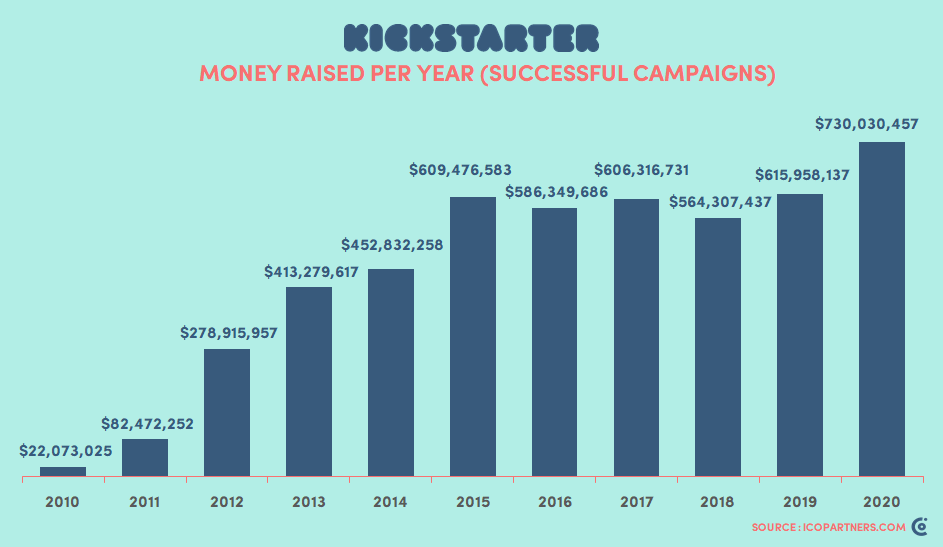7 reasons why crowdfunding is not for everyone
Startup businesses are risky by nature and money in a startup is considered risk assets. Not exclusively using your and your family’s money is therefore recommended. What are your alternatives then?
My experience is that all startup businesses are financed with the owner’s own money to some extent in the beginning. Some entrepreneurs are experienced and have a network of business partners that can be used to quickly raise investment money, others need to has borrowed money from friends and family.
One way of raising capital for a startup is through crowdfunding. Crowdfunding has increased a lot in recent years. Crowdfunding began for not so long ago. The first major crowdfunding site was Indiegogo, which focused on promoting art. Indiegogo was launched in 2008. Today perhaps the biggest one is Kickstarter.

The amount of raised capital on the Kickstarter platform has gone from 22M USD in 2010 to over 730M USD in 2020.
Kickstarter is one of the bigger players, but there are others as well. Here below are a few of the big ones.
Some businesses see crowdfunding as an interesting alternative in case they can’t get a loan from a bank, also it is seen as a way to raise money fast, without any big upfront fees. New start-ups can potentially raise hundreds of thousands of pounds in a matter of days with an attractive pitch and business plan.
At first sight, crowdfunding looks interesting for any startup business, but crowdfunding is not for everyone, even though it is true that some successful companies have started up as crowdfunded projects. A few projects that can be mentioned in this category are the game Star Citizen, which raised more than 400M USD up to date, and the blockchain product Filecoin which raised more than 257M USD in 2017.
I got interested in crowdfunding after one of my clients involved me in his attempts to raise capital. I have a few concerns about this and wanted to share my opinions about crowdfunding in this post, with a focus on why it is not always a good idea.
1. Crowdfunding has a general low rate of success
If you don’t have a good business plan and/or a project suited for crowdfunding and if you are not ready to spend a considerable amount of money and time to prepare your camping, you will end up in the group of 60%+ of all crowdfunding projects that fail to raise capital using crowdfunding. Even if you do everything right, you are still likely to fail. This is according to Kickstarter statistics.
If you look at other sources, like Fundera, the success rate is even lower and only 22.4 percent of all campaigns are successful according to them.
The low success rate is important to consider if you think about some of its consequences. With a failed crowdfunding campaign you certainly have at least reduced, if not destroyed your chances of raising capital by other means.
2. With crowdfunding you are exposing your valuable ideas online for others to steal.
It’s vital to build intellectual property protection to avoid this risk before publishing any material online. This can be done using trademarks, copyright ownership, and patents. Getting a patent for your product is the gold standard of intellectual property but getting one for a software product is extremely hard and many start-ups fail with this. The next best thing is to rely on trademarks and copyright protection.
Putting your projects on a crowdfunding platform will certainly lead to exposure, but it might lead to bigger fishes stealing your ideas. There are many, many examples of this out there.
3. The risk of getting low-quality investors onboard
Seeking investors as a startup is rarely only about money. Most people in the world with good ideas for a product do not have the network of resources or the mindset to turn their idea into a successful business. That is why it is so important to consider other aspects than just the money when seeking investors.
If you compare crowdfunding with seeking investment with a venture capital firm, you are much more likely to be successful with the latter for the simple reason that a venture capital firm will be an active part of your business in a way you are not likely to get through a crowdfunding campaign.
We at Hire Quality Software can sometimes help reach out to various contacts that we have in our network.
4. Your software product might not be eligible for crowdfunding
Software products can be a good match for crowdfunding, but there are restrictions to consider. In the case of Kickstarter, you can’t fund a software project unless you are making the product yourself as a software developer and a programmer (or one of your co-founders are a software developer). You can also not raise funds using this channel for websites or eCommerce sites, or anything using existing CMS software platforms.
With your own product, having a focus on creating an MVP (Minimal Viable Product) is highly recommended, because you want to keep things flexible to begin with, and you don’t want to end up spending all your capital on something that you later cannot capitalize on.
Hire Quality Software can be a partner and in this case. You can read more about our outsourcing services here.
5. Crowdfunding is complicated and expensive
Crowdfunding platforms will charge a wide array of fees in connection to a campaign, like transaction charges and administration charges and commission charges. There are also legal costs involved when doing Crowdfunding.
6. Unless you have a project with a high return potential, don’t bother.
Successful crowdfunding projects have in common that they have a high return potential, with a high risk/reward ratio. Crowdfunding works best for niche products, that introduce something new to the world never seen before.
7. With crowdfunding, you put your reputation at risk.
Crowdfunding brings the transparency of the outcome to a big audience. Unlike a venture capital funded business, crowdfunding puts your early-stage company’s performance in full public view, and if you fail, your reputation will be affected by it.
What are the alternatives to crowdfunding?
There are many alternatives to crowdfunding and the most obvious one is commercial bank loans. We at Hire Quality Software thinks that a better approach is to search for partners and professional investors. But, be prepared that any large investor always going to want equity, so you need to be prepared to lose some control over your business.

